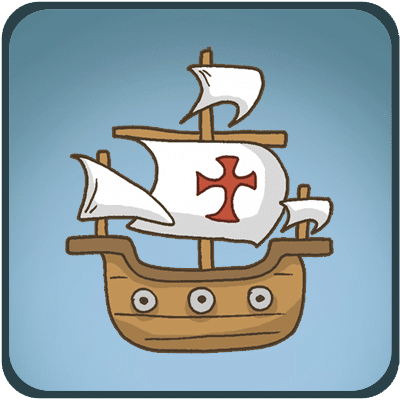Another name for this epoch is the Renaissance. This lasted from 1500 to 1600. In this century many changes and discoveries took place. But as art moved back to the classical period, science looked on. People started to rethink and criticize their own lifestyle. They used to have science based on the Christian faith. Now they had become of the opinion that faith could no longer be the basis for science. They believed that they now had to base knowledge on perceptions and insight. This caused major changes in history.
A major change in the 16th century came from overseas tours. Columbus, Vasco da Gama and Magelhães were important explorers. They wanted to spread the Christian faith and increase their political power. For this, they needed a larger area. The above men had indeed discovered new land. This also gave them more trading opportunities. As early as the end of the 15th century, Columbus had discovered America and gave this land to the Spanish king. In the same century Giovanni Caboto had discovered North America. He sailed on behalf of England and so the land was given to the English king.
In the 16th century people were mainly looking for other sea routes to India. Thanks to this search, they discovered much more new land. This was all colonized. The world gradually became a patchwork of different European colonies. The Netherlands had many colonies in Asia and Central America. Spain had in history its colonies mainly in South America and England in India and North America.
Not only thanks to all these discoveries, new maps had to be drawn. The borders in Europe also shifted back and forth during this period. The Netherlands was in conflict with its Spanish ruler. The Dutch followed the new trend in the field of religion. This was the reform. In the 16th century, the Church was strongly reformed. The Catholic Church had been the only Christian church for centuries. Rome was in charge of the Christians. There were more and more reformers commenting on this. Some of them were Calvin and Luther. They gained a lot of followers in Germany and in the Netherlands. However, the Spanish king remained Catholic and did not tolerate these reforms. He wanted to keep power in every corner of his kingdom. This meant that the subjects had to profess the religion he had chosen. So Catholicism.
The Dutch nobility became rebellious. They demanded from their King Philip II that he grant them privileges. They also wanted the reformers to be given more freedom and thus no longer be persecuted. Philip II did not respond to these demands. This was the beginning of the 80-year war. This war eventually led to the Netherlands becoming an independent state. The republic of the seven united Netherlands.
- Changing human and worldview of the Renaissance and the beginning of a new scientific interestHave you ever heard of Erasmus? There are streets, schools and a bridge named after him. He was very important to Dutch history.
- The beginning of European overseas expansionThe world is at your feet. Do you know this saying? In the era of the explorers and reformers, they have discovered almost all parts of the world.
- The Reformation and the division of the Christian ChurchHow many churches are in town with you? Probably a lot. The Catholic churches are the oldest in history. It wasn't until later that other churches joined.
- The uprising and the emergence of an independent Dutch stateThe Pope is very powerful. But back in history, his power was much greater. Did you know that the Netherlands had to fight its way free from the Catholics?
